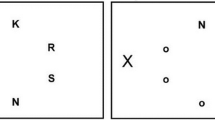Abstract
A total of 33 patients with early and continuously-treated phenylketonuria (PKU) between 7 and 16 years of age and 33 matched controls participated in a study examining perceptual, central, and response-related mechanisms of information processing. The specific mechanisms studied were: perceptual filtering, memory search, response selection, response execution, and motor presetting. In addition, groups were compared on mean intelligence level and task oriented behaviour. The performance of the PKU patients practically matched that of the controls on all three tasks, suggesting that PKU patients who are continuously maintained on a well-controlled phenylalanine-restricted diet are not impaired in the elementary mechanisms of information processing. Furthermore, groups did not differ in mean IQ or task-oriented behaviour.
Similar content being viewed by others
Abbreviations
- PKU :
-
phenylketonuria
- Phe :
-
phenylalanine
- IQ :
-
intelligence quotient
- ISI :
-
inter-stimulus interval
- WISC-R :
-
Revised Wechsler Intelligence Scale for Children
References
Anderson VE, Siegel FS, Fisch RO, Wirt RD (1969) Responses of phenylketonuric children on a Continuous Performance Test. J Abnorm Psychol 74:358–362
Brookhuis KA, Mulder G, Mulder LJM, Gloerich ABM (1983) The P3 complex as an index of information processing: The effects of response probability. Biol Psychol 17:277–296
Brunner RL, Berry HK (1987) Phenylketonuria and sustained attention: the Continuous Performance Test. Int J Clin Neuropsychol 9:68–70
Brunner RL, Jordan MK, Berry HK (1983) Early-treated phenylketonuria: neuropsychologic consequences. J Pediatr 102:831–835
Brunner RL, Berch DB, Berry HK (1987) Phenylketonuria and complex spatial visualization: an analysis of information processing. Dev Med Child Neurol 29:460–468
Clarke JTR, Gates RD, Hogan SE, Barre M, MacDonald W (1987) Neuropsychological studies on adolescents with phenylketonuria returned to phenylalanine-restricted diets. Am J Ment Ret 92:255–262
Craft S, Gourovitch ML, Dowton SB, Swanson JM, Bonforte S (1992) Lateralized deficits in visual attention in males with developmental dopamine depletion. Neuropsychologia 30:341–351
Diamond A, Hurwitz W, Lee EY, Bockes T, Grover W, Minarcik C (1994) Cognitive deficits on frontal cortex tasks in children with early treated PKU: results of two years of longitudinal study (in press)
Eriksen CW, Schultz DW (1979) Information processing in visual search: a continuous flow conception and experimental results. Pere Psychophysiol 25:249–263
Huisman J, Slijper FME, Hendrikx MMT, Kalverboer AF, Schot L van der (1985) Development of the intellect of phenylketonuria patients; 15 years' nationwide screening in the Netherlands (in Dutch). Ned Tijdschr Geneeskunde 136:2277–2281
Kalverboer AF, Schot L van der, Hendrikx MMH, Huisman J, Slyper FME, Stemerdink BA (1994) Social behavior and task orientation in early-treated PKU. Acta Paediatr Scand 83 [Suppl] 407:104–105
Kalverboer AF, Stemerdink BA, Siebelink BM, Treffers PDA (1994) A School Behaviour Questionnaire (the GBS short) for screening and clinical purposes.
Koch R, Azen CG, Hurst N, Gross-Freidman E, Fishler K (1987) The effects of diet discontinuation in children with phenylketonuria. Eur J Pediatr 146 [Suppl 1]:A12-A16
Lou HC, Lykkelund C, Gerdes AM, Udesen H, Bruhn P (1987) Increased vigilance and dopamine synthesis by large doses of tyrosine or phenylalanine restriction in phenylketonuria. Acta Paediatr Scand 76:560–565
Medical Research Council Working Party Phenylketonuria (1993) Phenylketonuria due to phenylalanine hydroxylase deficiency: an unfolding story. BMJ 306:115–119
Medical Research Council Working Party Phenylketonuria (1993) Recommendations on the dietary management of phenylketonuria. Arch Dis Child 68:426–427
Meere JJ van der, Baal M van, Sergeant JA (1989) The additive factor method: A differential tool in hyperactivity and learning disability. J Abn Child Psychol 17:409–422
Meere JJ van der, Vreeling HJ, Sergeant JA (1992) A motor presetting study in hyperactive, learning disabled and control children. J Child Psychol Psychiatry 33:1347–1354
Mulder G (1983) The information processing paradigm: concepts, methods and limitations. J Child Psychol Psychiatry 24:19–35
Pennington BF, Doorninck WJ van, McCabe LL, McCabe ERB (1985) Neuropsychological deficits in early-treated phenylketonuretic children. Am J Ment Def 89:467–474
Ridderinkhof KR (1993) Interference from irrelevant information. PhD Thesis. University of Amsterdam
Ris MD, Williams SE, Hunt MM, Berry HK, Leslie N (1994) Early-treated phenylketonuria: Adult neuropsychologic outcome. J Pediatr 124:388–392
Saudubray JM, Rey F, Ogier H, Abadie V, Farriaux JP, Ghisholfi J, Guibaud P, Rey J, Vidailhet M (1987) Intellectual and school performances in early-treated classical PKU patients. The French Collaborative Study. Eur J Pediatr 146 [Suppl 1]:A20-A22
Seashore MR, Friedman E, Novelly RA, Bapat V (1985) Loss of intellectual function in children with phenylketonuria after relaxation of dietary phenylalanine restriction. Pediatr 75:226–232
Smith I, Beasley MG (1989) Intelligence and behaviour in children with early treated phenylketonuria. Eur J Clin Nutr 43:1–5
Smith I, Beasley MG, Wolff OH, Ades AE (1988) Behavior disturbance in 8 year-old children with early-treated phenylketonuria. J Pediatr 112:403–408
Smith I, Beasley MG, Ades AE (1990) Effect on intelligence of relaxing the low phenylalanine diet in phenylketonuria. Arch Dis Child 65:311–316
Sonneville LNJ de, Schmidt E, Michel U (1989) Information processing in early treated PKU. J Clin Exp Neuropsychol 11:362
Sonneville LMJ de, Schmidt E, Michel U, Batzler U (1990) Preliminary neuropsychological test results. Eur J Pediatr 149 [Suppl 1]:S39-S44
Sternberg S (1969) The discovery of processing stages: extensions of Donders' Method. Acta Psychol 8:276–315
Welsh MC, Pennington BF, Ozonoff S, Rouse B, McCabe ERB (1990) Neuropsychology of early-treated phenylketonuria: specific executive function deficits. Child Dev 61:1697–1713
Author information
Authors and Affiliations
Rights and permissions
About this article
Cite this article
Stemerdink, B.A., van der Meere, J.J., van der Molen, M.W. et al. Information processing in patients with early and continuously-treated phenylketonuria. Eur J Pediatr 154, 739–746 (1995). https://doi.org/10.1007/BF02276719
Received:
Accepted:
Issue Date:
DOI: https://doi.org/10.1007/BF02276719




